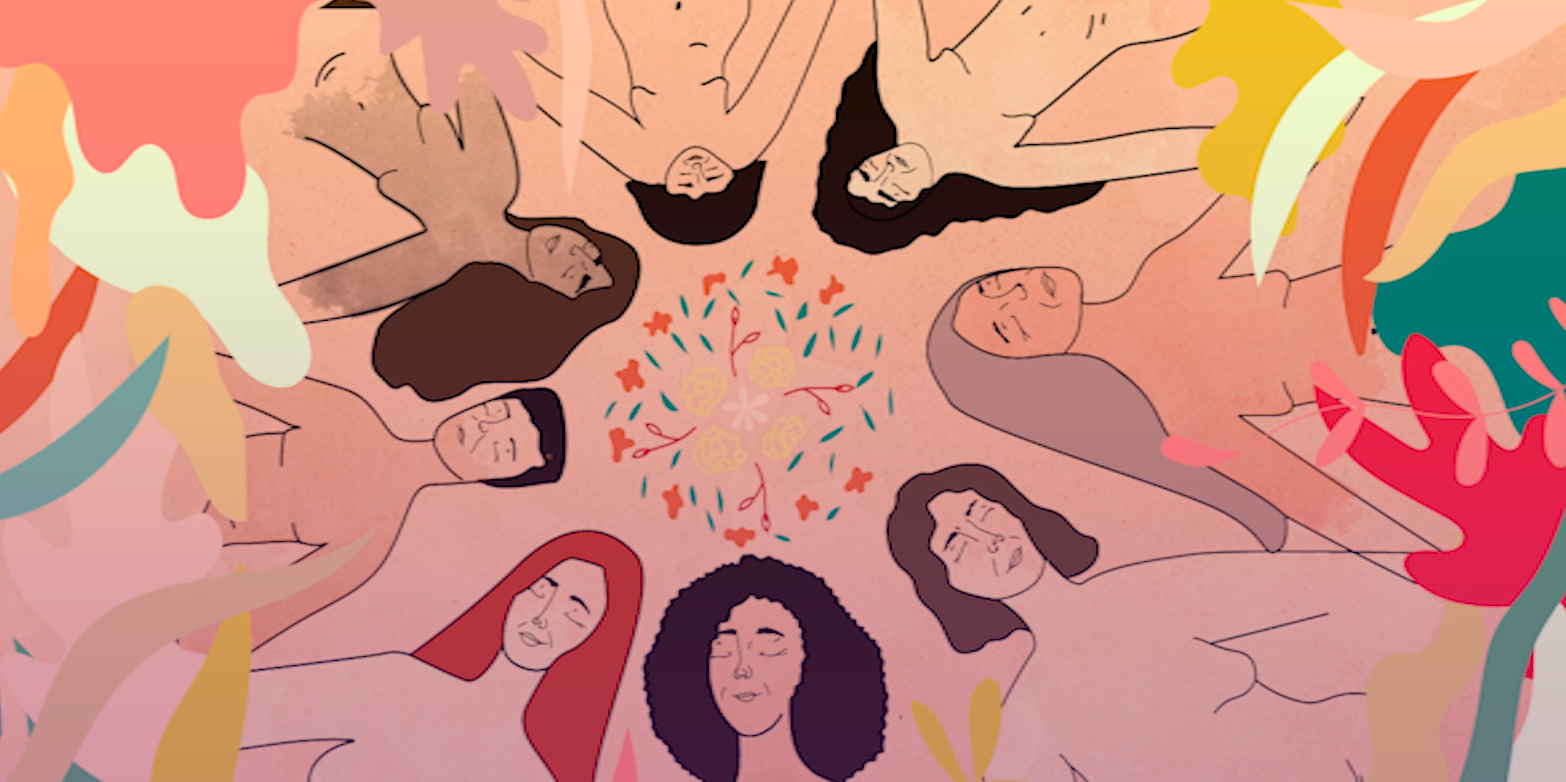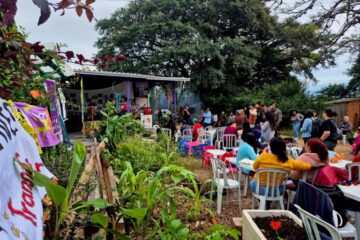On May 10th and 11th, the voices, poems, and songs that launched the latest Feminist School session, about body and sexuality, passed on the message from women and everyone who does not conform to the imposition of heteropatriarchal and racist norms on their bodies and sexualities, as they say “enough!”
Colonialist and heteropatriarchal capitalism imposes itself on what we feel and desire. It controls territories and bodies, with violence and militarization, and inflicts punishments against those who don’t conform to the norm.
Heteronormativity, gender binarism, and ideals of white femininity and masculinity are historical constructs.
With our indigenous sisters from Iximuleu/Guatemala, we learned about concepts of body-earth territory. Body and earth nurture each other for resistance, for women’s historical practices to sustain life.
Our bodies are territories that are continuously disputed. In groups, the participants shared their understanding about how this battle is directly connected to the logic of capital accumulation, which needs to control and discipline bodies for work. In this sense, the appropriation of our bodies is built into systemic oppressions: it is about colonization, white supremacy, the exploitation of labor, and land hoarding.
What affects land also affects our bodies.
The commodification of women’s bodies and sexualities is part of a process that trades our lives and nature in the market. Commodification, pornography, and prostitution are connected to neoliberalism, and we face new ways in which women and nonconforming bodies are lured to serve men and hegemonic bodies. We face new ways in which subjectivity is seized by the media and social media, which impose white and Western standards of beauty and behavior.
Women and gender-nonconforming bodies are systematically punished, blamed, criminalized. The forced disappearance and murder of Indigenous women, genital mutilation, transphobia, and lesbophobia were some of the forms of violence participants highlighted. The challenge is how to face them as a whole, uncovering different types of abuse as tools of colonialist heteropatriarchy. School participants also questioned the mechanisms used by states, which ally themselves with religious sectors and actively take part in these dynamics of control, holding women accountable for the violence they endure.
Increase in violence is part of a misogynistic and colonialist reaction against women. The groups talked about how the control over bodies and sexualities is part of a power struggle. Women and those who don’t conform to norms of gender and sexuality are powerful when they organize.
In-depth Analysis
María Dolores and Tita Godinez, of the Political Alliance, Women’s Sector [Alianza Política Sector de Mujeres] from Guatemala, facilitated the discussion and introduced views that bring together body and sexuality. María Dolores underscored four aspects that connect with the group reflections. One is about understanding the body as a territory around which life organizes itself, and therefore it is constantly disputed.
In resistance, we need to decolonize our mind, imagination, and pleasure, taking back this body-earth territory for Buen Vivir [good living].
The control over bodies and sexualities is inherent to the process of capital accumulation. Having this perspective in mind, we challenge the creation of needs, the subjection of desires, and the organization of the family. In this sense, love turns into an institution that makes care work seem like a natural responsibility that women should bear.
The material and symbolic institutions that control bodies and sexualities include education, which contributes to manipulate desire and internalize hierarchies, religious institutions, and political pacts that pathologize and criminalize nonconformity. The imposition of compulsory heterosexuality, motherhood as fate, female monogamy, and the ownership over bodies stand out.
The final element participants reflected on was heteronormativity as a political regime, as it imposes sexualities that are oriented toward the social reproduction of capital, the manipulation of desires, and the control over subjectivities. In this violent process that has colonialist roots, bodies are classified according to an imposed gender binarism, and races are created, along with a hierarchization that punishes those who don’t conform to the norm.
School participants shared how these issues emerge in their specific contexts. They talked about needing to face the silence, the shame, and the guilt that mark the experiences of women and gender-nonconforming bodies around the world.
We listened to analyses on the violence of genital mutilation, which forcibly denies women pleasure; “conversion” therapy, an institutionalized form of violence against lesbian, gay, and nonconforming bodies; the criminalization of homosexuality in penal codes as a colonial heritage; and others.
In face of so many different forms of control, we find struggle and resistance in experiences of grassroots feminism: to challenge forced marriage, to reclaim the right to abortion and secular state, to promote lesbian visibility, diversity, and nonconformity visibility; to tackle prostitution and build alternatives for victims and survivors; to challenge the commodification and the medicalization of bodies, and to put an end to all forms of violence.
These are struggles that are realized in society in general and in mixed-gender organizations, where we still need to tackle forms of control that impose women’s submission in politics.
A World of Autonomy and Freedom is Built Through the Struggle
In addition to in-depth critical analyses, grassroots feminism has been building possibilities of change everywhere. A sister was right to remind us, we cannot wait until a revolution starts to liberate our bodies and sexualities. We must do it now, as part of our struggles.
Therefore, inspired by the video below, which proposes ideas to liberate our bodies and sexualities, we gathered again in groups to share our dreams and the worldviews we struggle to build, as well as actions and strategies we must strengthen along this path.
Ending all forms of violence is part of our dream. This can only be possible in a decolonized society, where people have autonomy over their own bodies; where sexual relations can actually be free, with no money or power exchange. Freedom cannot be traded in the market—it can only be possible through equality and justice.
The struggle for this other world calls us to challenge norms and impositions, to unlearn and learn again. With our wisdom and shared, stereotype-free leadership, we put the self-determination of our bodies and wisdom center stage in the battle to reorganize power. For this purpose, one strategy is regarding grassroots feminist education—from women, for women, and acknowledging nonconforming bodies as a political category. The concepts we use to explain our lives and reclaim another world have meaning and they are forged in the context of the struggle. We must not separate our bodies from where we are: defending water is about defending our healthy bodies, because we are integral beings, and we are nature. Learning from the diversity of nature is also about acknowledging and claiming gender nonconformity.
To achieve our dream, to live in a world where diversity is the reference, with no polar opposites between masculine and feminine, we must build movements where gender-nonconforming bodies have visibility and play a primary role, where desire is not punished, and pleasure is experimented and experienced. This is why it’s so important for grassroots feminism to fight taboos and the silence around sexuality, bringing this conversation to the public realm. Let us nurture kinships to build a world with no violence.
All these collective dreams require strategy, discussion, and organization to be able to face the contradictions and controversies around these issues and to be able to build syntheses that can strengthen us as movements.
This is about an ability to take back a critical view, from grassroots feminism, against the patriarchal and racist traps that limit our struggles for autonomy to the constraints and restraints of colonial neoliberalism. This is the case of hegemonic narratives about “individual choices,” as they are not connected to the criticism of systemic oppressions, creating traps and downplaying the conversation, whether by preventing or manipulating it.
These reflections on body and sexuality are deeply connected with the discussions from previous sessions, about systems of oppression and the defense of Mother Earth. This is a requirement to make the demands for autonomy and freedom part of emancipatory struggles, bringing together individual and collective, subjectivity and material living conditions. This is a view conveyed every time we state: “we will keep marching until all of us, our bodies, peoples, and territories are free!”




